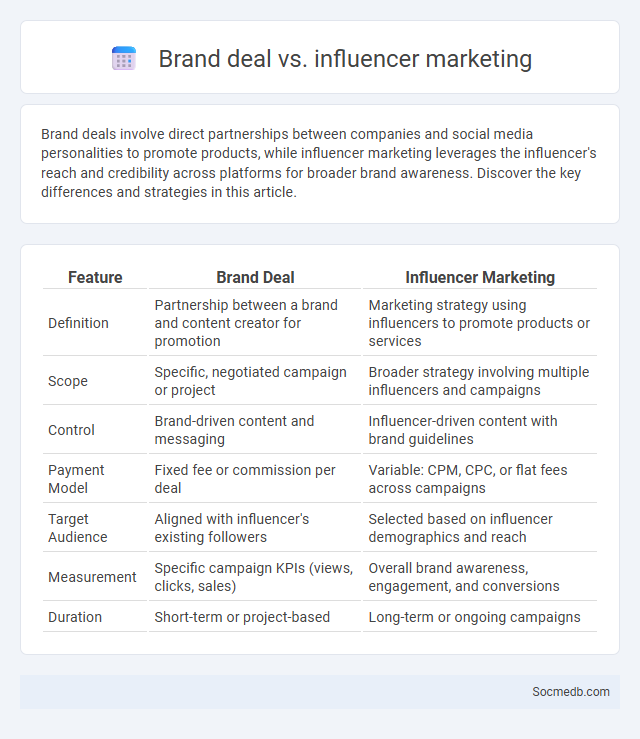
Photo illustration: Brand deal vs Influencer marketing
Brand deals involve direct partnerships between companies and social media personalities to promote products, while influencer marketing leverages the influencer's reach and credibility across platforms for broader brand awareness. Discover the key differences and strategies in this article.
Table of Comparison
| Feature | Brand Deal | Influencer Marketing |
|---|---|---|
| Definition | Partnership between a brand and content creator for promotion | Marketing strategy using influencers to promote products or services |
| Scope | Specific, negotiated campaign or project | Broader strategy involving multiple influencers and campaigns |
| Control | Brand-driven content and messaging | Influencer-driven content with brand guidelines |
| Payment Model | Fixed fee or commission per deal | Variable: CPM, CPC, or flat fees across campaigns |
| Target Audience | Aligned with influencer's existing followers | Selected based on influencer demographics and reach |
| Measurement | Specific campaign KPIs (views, clicks, sales) | Overall brand awareness, engagement, and conversions |
| Duration | Short-term or project-based | Long-term or ongoing campaigns |
Introduction to Brand Deals and Influencer Marketing
Brand deals and influencer marketing represent a strategic partnership where social media creators collaborate with companies to promote products or services, leveraging their follower base to drive brand awareness and sales. Influencers use authentic content and targeted campaigns to engage audiences, making brand deals a powerful tool for businesses to reach niche markets effectively. The increasing demand for genuine recommendations has propelled influencer marketing as a dominant force in digital advertising, with platforms like Instagram, TikTok, and YouTube serving as key channels.
Defining Brand Deals: Key Features
Brand deals in social media involve partnerships between influencers and brands where content creators promote products or services to their followers. These collaborations typically include sponsored posts, exclusive discount codes, and content creation guidelines to ensure brand alignment. Key features of brand deals emphasize audience reach, engagement metrics, and authentic messaging to drive effective marketing results.
Understanding Influencer Marketing Strategies
Influencer marketing strategies center on leveraging individuals with substantial social media followings to promote brands authentically and engage targeted audiences effectively. Key tactics involve identifying niche influencers whose content aligns with brand values, utilizing data analytics to measure engagement metrics, and crafting collaborative campaigns that drive conversions. Understanding follower demographics, engagement rates, and content resonance enhances campaign ROI by fostering genuine connections between influencers and consumers.
Brand Deals vs Influencer Marketing: Fundamental Differences
Brand deals involve companies directly partnering with social media personalities to promote products or services, typically through paid sponsorships that emphasize the influencer's reach and audience trust. Influencer marketing is a broader strategy encompassing collaborations where influencers create authentic content to engage followers, often leveraging their personal brand to drive organic promotion. The fundamental difference lies in brand deals being transactional agreements focused on immediate exposure, while influencer marketing prioritizes long-term relationship building and audience engagement.
Campaign Objectives: Which Approach Delivers Better Results?
Choosing the right social media campaign objective significantly impacts Your return on investment and engagement rates. Objectives like brand awareness maximize reach, while conversion-focused campaigns drive measurable actions such as purchases or sign-ups. Evaluating Your specific goals helps determine whether engagement, traffic, or sales-oriented approaches deliver the best results for Your target audience.
Cost Analysis: Budgeting for Brand Deals and Influencer Marketing
Effective cost analysis for social media brand deals and influencer marketing requires detailed budgeting of expenses such as influencer fees, content production, platform advertising costs, and campaign management tools. Accurate forecasting models incorporate factors like influencer audience size, engagement rates, and niche relevance to optimize return on investment (ROI). Allocating budget efficiently ensures maximized exposure and measurable outcomes in brand awareness and consumer conversion rates.
Audience Reach and Engagement Comparison
Social media platforms vary significantly in audience reach and engagement, with Facebook leading in global active users, exceeding 2.9 billion monthly, while Instagram and TikTok excel in higher engagement rates, especially among younger demographics. Your choice of platform should consider these differences, optimizing content to maximize visibility and interaction based on target audience behavior and platform strengths. Analyzing engagement metrics such as likes, shares, comments, and watch time helps refine strategies to boost your social media impact effectively.
Measuring ROI: Brand Deals vs Influencer Collaborations
Measuring ROI in social media marketing requires analyzing brand deals and influencer collaborations through metrics like engagement rate, conversion rate, and customer acquisition cost. Brand deals often provide direct control over messaging and predictable budgeting, whereas influencer collaborations leverage authentic content and niche audience targeting to boost brand awareness. Tracking platform-specific KPIs such as click-through rates on Instagram Stories or YouTube video views offers quantifiable insights to optimize future marketing strategies.
Choosing the Right Approach for Your Brand
Selecting the right social media strategy involves understanding your brand's core values and target audience behavior on platforms like Instagram, Facebook, and LinkedIn. Tailored content that aligns with your brand identity increases engagement rates and fosters loyalty across digital channels. By analyzing analytics and customer feedback, you ensure your approach maximizes visibility and strengthens your online presence.
Future Trends in Brand Deals and Influencer Marketing
You can expect future brand deals and influencer marketing to prioritize authentic engagement and micro-influencers with niche audiences for higher ROI. Artificial intelligence and data analytics will enhance targeting precision, enabling brands to craft personalized campaigns that resonate deeply with specific follower segments. Emerging platforms and augmented reality features will offer innovative opportunities for interactive and immersive influencer collaborations.
 socmedb.com
socmedb.com